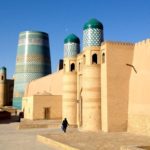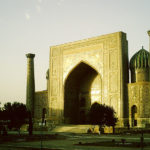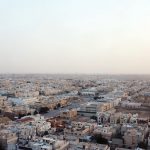One of the first things we noticed arriving in Tashkent were the numbers of policemen–on the streets, at subway entrances and down in subway stations (where photos are forbidden), 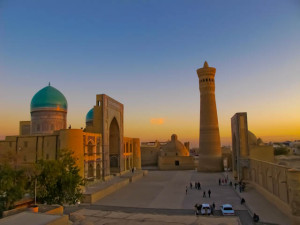 in public markets, patrolling pedestrian underpasses of main roads, on major bridges over rivers, cruising the streets in cars and jeeps. They can stop and detain any driver to see their papers are in order–and mostly likely speedup the delay with a few som (money) slipped between palms. Police are present on street intersections, outside theaters, hotels, museums, and of course government buildings. But they aren’t all bad: three of them in a patrol car gave us a ride to our tour office one day when we were lost. (photo right, Bukhara Kaylon mosque and minaret)
in public markets, patrolling pedestrian underpasses of main roads, on major bridges over rivers, cruising the streets in cars and jeeps. They can stop and detain any driver to see their papers are in order–and mostly likely speedup the delay with a few som (money) slipped between palms. Police are present on street intersections, outside theaters, hotels, museums, and of course government buildings. But they aren’t all bad: three of them in a patrol car gave us a ride to our tour office one day when we were lost. (photo right, Bukhara Kaylon mosque and minaret)
What does this mean for a society? The streets are clean, the trees are trimmed, the public gardens are watered, the weeds are dug out between pavement bricks, students do not organized rallies, workers go quietly to work, students to universities dressed in dark pants and white shirts. Drivers stop for red lights. People behave.
On tour with our driver and guide from Tashkent into the eastern snow-capped mountains my driver reminded me at every bridge and tunnel “no photos’ because there are police or military guards watching the traffic and he was afraid, paranoid after living half his life under a fist. Along the way, east to the mountains and west to the desert, every few miles a checkpoint to present the driver’s permits and/or show our passports.
Uzbekistan and Turkmenistan are considered the most authoritarian countries of the former Soviet states. People who digress from the designated norm are viewed with suspicion, scorn or as illegitimate such as gypsies, political opponents, human rights activists, foreign NGOs and of course homosexuals, which both countries criminalize (the only nations in the World Health Organization’s Europe Region to do so).
Things Seen and Unseen
What a visitor will not see in Uzbekistan is a gay community because same-sex activity if discovered is punishable with a prison sentence. They mean business here since this is essentially a police state with zero tolerance for pushing back against political suppression or taunting the authorities with a flash mob rally for gay rights. There is no visibility because there is no chance to be visible. Trouble makers are pounced on.
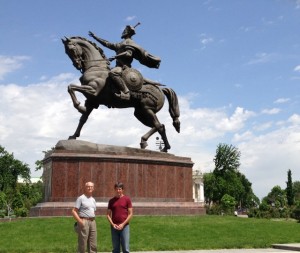 One day as we sat at a cafe having tea and cake we were seated two tables away from a pair of policemen having coffee when suddenly they were alerted to a problem and sprang from their seats and ran off to deal with the disturbance. They did not return as long as we remained. All policemen carry a hand gun and a phone device so if there is anything unusual a dozen policemen will be on the scene within minutes. (photo left, Tashkent: Richard and Michael by statue of Tamerlane)
One day as we sat at a cafe having tea and cake we were seated two tables away from a pair of policemen having coffee when suddenly they were alerted to a problem and sprang from their seats and ran off to deal with the disturbance. They did not return as long as we remained. All policemen carry a hand gun and a phone device so if there is anything unusual a dozen policemen will be on the scene within minutes. (photo left, Tashkent: Richard and Michael by statue of Tamerlane)
That said, it is rare to find a LGBT citizen serving jail time for a sex crime, first because two people have to be caught in the act by a witness and, more often, the offense is handled on the spot with a fistful of som money.
In 2010 health advocate Maxim Popov was convicted for distributing a brochure (funded by the non-partisan Global Fund to Fight AIDS and UNICEF) that was intended to raise awareness about AIDS in the country. A knowledgeable person about the trial said “prosecutors argued that the brochure, which called for the use of condoms during sex and sterile needles when injecting drugs, was promoting immoral behavior.” (http://madikazemi.blogspot.com/2010/03/uzbekistan-jails-aids-advocate-over.html)
At least one source claims that Uzbekistan has the highest number of HIV infections in Central Asia and highest rate of of new infections. Health advocates report that the actual number of registered cases has been concealed by the state, no doubt because most are drug-abuse cases which would threaten the illusion that Uzbekistan is a ‘clean’ country. (It’s ironic that due to the harsh repression of homosexuality new gay HIV infections are low.)
Needless to say being arrested or incarcerated in this country is rough, dangerous and harmful to one’s health so most people behave as ordered with little overt crime or disturbance by the common man. Unseen of course is the silent crime of corrupt money and power that enriches a few and eludes scrutiny. The best investment for shady money is real estate. Throughout the city there are grand ma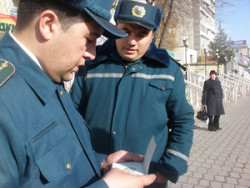 nsions and apartment buildings constructed or bought by the privileged to launder questionable funds. We were told that many new fashionable apartment blocks are empty and most of the high end mansions are rented out to foreigners engaged in international business. (photo right, typical police street check)
nsions and apartment buildings constructed or bought by the privileged to launder questionable funds. We were told that many new fashionable apartment blocks are empty and most of the high end mansions are rented out to foreigners engaged in international business. (photo right, typical police street check)
The once lucrative business of catering to NGOs for services and goods is slowly recovering from the eviction of all international charities by the strong-armed president Karimov. He expelled them in retaliation for their criticism of his brutal putdown of a demonstration in the eastern city of Andijon in 2005 where police fired live ammunition into the crowd killing dozens or hundreds of people. The truth is murky and complex. (See: http://en.wikipedia.org/wiki/Andijan_massacre)
In 2012, the Danish journalist Michael Andersen completed an 80-minute film called ‘Massacre in Uzbekistan’.
The massacre only made things worse for the LGBT community in a country that was already hostile to gays. Suspicion and paranoia of ‘non-normative’ behavior, whether real or not, manifests today in the ever vigilant watch guards in public–not to mention covert surveillance by security forces This creates a milieu of fear that is unsettling for LGBT people. If our (straight) driver was nervous about my taking photos of bridges or tunnels, at a long distance in a moving car where being seen as very unlikely, then being seen as queer is uppermost in the mind of every LGBT citizen living in Uzbekistan’s cities and villages.
Despite occasional scary headlines of “arrests and abuses of citizens by the police for having an intimate relationship with another man”, there is no active witch hunt for gays in the bars, clubs, sports venues or universities. During our visit we saw or heard nothing like that. But I have read that police occasionally use internet sting operations to bust gays. (see story below).
During our three weeks of traveling around Uzbekistan (by car, train, bus and plane; sorry no camels) we traveled as a couple with no questions asked–that is, until one of our several designated tour drivers, Serge, a 60ish former officer in the army, chauffeured us to a historic site for viewing. While Michael climbed the hill to the ancient Zoroastrian cemetery at Shylpyk-Kala, in the middle of a desert, I stayed behind by the car and Serge and I small-talked about California and former governor ‘Schwarznar’ and other forgettable things.
Then he casually asked if we were brothers to which I said ‘no, friends’ to which he asked ‘long time?’ to which I said ‘yes, 25 years’ to which he rubbed two forefingers together saying ‘gay?’ to which I said ‘yes’. He frowned and started to look away but I caught him up by saying something to the effect of it being ‘natural… since a 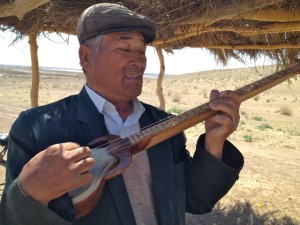 little boy… the Koran is wrong…’ Serge did not argue back.
little boy… the Koran is wrong…’ Serge did not argue back.
(photo left, native folk singer; friend of Serge’s)
And that was it. No further discussion. If he were upset he did not show it and he continued to be his usual gruff yet cheerful self. He was surprised, not reactive or disgruntled or hostile toward us as we continued driving westward toward the dried up disaster of the Aral Sea We three actually got along easily for this part of our ten-day tour of the legendary Silk Road tour with its four famous cities of Tashkent, Samarkand, Bukhara and Khiva–as well as the Aral Sea.
Stealth
Being gay in UZB is a lesson in stealth living. Few people want to hear or know about or understand the nature of homosexual orientation. It is overall a repressed society even though free enterprise is developing and is superficially successful. But there are NO newspapers here with outside news; no TV stations that broadcast foreign events, except in upper class hotels with international TV channels, such as ours. Yet there is internet that goes far beyond the borders.
There is no gay scene here as people live in paranoid fear of police intrusion into their personal lives if they step out of line and cause any social or political ruffle. Police can stop anyone anywhere for anything whether for a real or imagined infraction–or a shakedown.
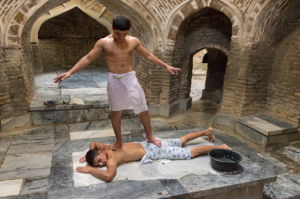 Most people live in close proximity with others, family or neighbors or strangers (who know each other even if not friends) so there is nowhere to hide if you are ‘different’. People make it their business to know others’ business. In rural and suburban Uzbekistan families live in clusters in large houses, often three or four generations or related kin under one roof or nearby. Being gay is illegal but the much greater inhibiting force is bringing shame and dishonor to one’s family, which can be a lot of people since traditionally there were five to twelve children born of one couple.
Most people live in close proximity with others, family or neighbors or strangers (who know each other even if not friends) so there is nowhere to hide if you are ‘different’. People make it their business to know others’ business. In rural and suburban Uzbekistan families live in clusters in large houses, often three or four generations or related kin under one roof or nearby. Being gay is illegal but the much greater inhibiting force is bringing shame and dishonor to one’s family, which can be a lot of people since traditionally there were five to twelve children born of one couple.
(photo right, homoerotic Turkish bath house Bozori Kord and massage in Samarkand)
This is sad in light of the artistic history in central Islamic Asia where same-sex love and passion were historically expressed in poetry and painting and dance in earlier centuries. Gone mostly due to the brutal 19th century intrusion of Russia into these Central Asia cultures that lasted for over a hundred years. Today that same mentality of socialist control of over people’s lives still exists in the form of the current strongman Karimov who has been in power for more than twenty-three years and consolidates his power with military might and police fear. There is no chance of an ‘Arab Spring’ here.
Four Contacts
Despite several efforts to find a live LGBT person in UZB I did not encounter a single one–at least as far as I could tell; gays are not readily visible. There were many furtive side glances but those are hard to discern whether out of curiosity toward a stranger or a secret fantasy. However, there was a well-known and respected actor and director in the Ilkhom Theatre who is openly gay but, as I found out after arriving in Tashkent, he moved to New York where he lives today, proving the point that being a successful LGBT Uzbek means emigrating to another country.
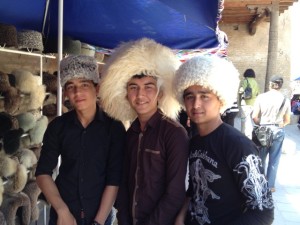 See the interview with Maxim here.
See the interview with Maxim here.
This, despite the observable reality that there are many handsome young men with firm-fitting pants. But men do not seem to notice other men (how can I know this?) although friends often hug and gesture-kiss in public and touch each other as a close expression of liking.
(photo left, local tourists try on souvenir hats in Khiva)
First Contact
Our trip included drivers and guides at the several cities mentioned before. One such guide was a 20-something lovely young woman named Hassida, a college educated Muslim, living with her parents, unmarried sister and a brother (in a two bedroom flat). We chatted during our two days together about family life here. She has been waiting for her older sister to marry, as is customary, before she marries but now she is getting impatient and wants to marry soon. She will let her parents select an eligible man but not marry blindly; he has to be educated and nice and meet with her approval.
One day, during a pleasant visit to a landmark shrine to the ancient ruler Bobur in a park named after him I asked her (in private) if I could pose a personal question: how would she and her parents react if someone in her family, for example her brother or sister, told them he or she were gay? There was not much further to go with this discussion after she responded, politely: “my father would probably kill him or her…” Your father would kill his own child?, I asked. “Yes because that would bring shame on the family.”
I said I knew someone in Turkey who was killed by his father for being gay; shot him in daylight on the street. To which she responded, “yes that could happen here. It is a dishonor that can stain a family.” As for her own reaction to a gay sibling, “I would want them to leave the country and not see them again.” I was taken aback to hear this from a young educated person. She spoke calmly and with assurance, without annoyance, that this was the correct Muslim thing to do against a gay person; they have no place in this culture.
Second Contact
Another chance for me to ask my ‘loaded’ question again came one morning after breakfast when we met a handsome local male guide named Kamol who was waiting for his clients/tourists in the lobby of our hotel. His English was quite good. We chatted about the usual tourist things for a while–people, places, thing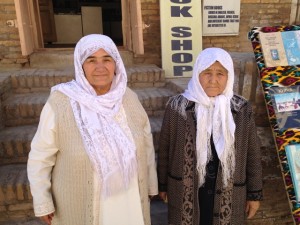 s.
s.
Then, aside, I asked him what his family’s reaction would be to discovering a sibling as gay or lesbian. I foolishly presumed that because he was well educated at a university and as a tourist guide with four years of experience with international people that his answer would be more positive than Hassida’s. Wrong. Kamol said being gay would be grounds for killing. He saw it as a duty of family members to remove a sin on the family that could not be otherwise resolved. (photo right, two mothers)
Kamol said he recently saw a gay guy on the street (how did he know?) so Kamol walked in a direction to avoid passing by him. He was afraid he would get angry and want to assault that person. This from an educated person who said he had studied psychology in college! “God made man and woman for each other,” he said, with no other possibility. It was unnerving for me to hear how his religion has blinded him to scientific understanding of human diversity.
But for at least few minutes he was willing to engage with me on the issue. He wondered how two men could have a baby to which I replied that they find a friendly woman/lesbian and give her sperm, by sex or donation or through adoption. I said a gay man can have sex with a women, physically have intercourse, but that was not what he desired. A gay man’s natural desire was toward other men–but not all men. Many gay men are married in the world–indeed most gay men–in order to be accepted in society and family and avoid the son and curse of homosexuality. (A young Muslim gay man from Yemen recently told me the same thing; he will marry in order not to lose this family or his country.)
Komol thought being gay was a sudden choice whereby a person wanted to be gay and went that way. He seemed ignorant of the evolved biological nature of human sexuality. I said that being gay was something natural from birth, for most LGBTs. That the process is a very complicated growth process involving genetics (which he also mentioned) and hormones. It was not something that came along years after birth that one suddenly decided upon. (photo left, Uzbek family; is the boy on the left gay? Click to enlarge.)
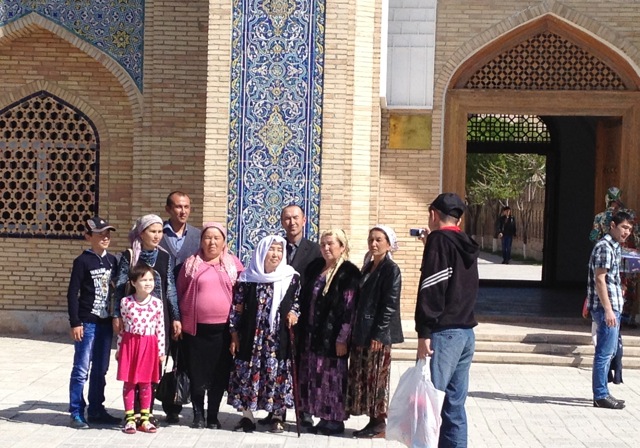 Much as I wanted to engage him more deeply I felt uneasy talking to someone whose mind seemed limited and closed by prejudice. I did not want to shake his skewed version of human nature in the brief moments of our conversation. I was wary of disturbing his mindset, his ignorance of human truth, urging him out of his religiously assured comfort zone. Indeed, it was a bit scary to talk–intelligently and thoughtfully–to someone who was so deeply programmed by Islamic ideas that blocked out real-world truths that conflicted with its doctrines. How could any educated person be so ignorant of human nature, so sure that Allah was an active force in making people heterosexual, all of them, in one mold with anything different or diverse worthy of murder?
Much as I wanted to engage him more deeply I felt uneasy talking to someone whose mind seemed limited and closed by prejudice. I did not want to shake his skewed version of human nature in the brief moments of our conversation. I was wary of disturbing his mindset, his ignorance of human truth, urging him out of his religiously assured comfort zone. Indeed, it was a bit scary to talk–intelligently and thoughtfully–to someone who was so deeply programmed by Islamic ideas that blocked out real-world truths that conflicted with its doctrines. How could any educated person be so ignorant of human nature, so sure that Allah was an active force in making people heterosexual, all of them, in one mold with anything different or diverse worthy of murder?
Third Contact
My third conversation was with Jaris, a thirty-something college educated articulate tour consultant who spoke fluent English, Russian and local Uzbek dialect. We had spoken several times in arranging a tour and visiting his office. At cafe lunch one afternoon (where ‘plov’ the national dish was served with a round bread called ‘non’ on the side) we talked about the business of tourism, the black money market (it’s pervasive; even hotel bellboys will offer to change money at a rate 30% higher than the bank rate), the two major ethnic populations in the country–Russians and Uzbekis–(there are numerous smaller other tribes) and the difference in family structures, language and attitudes.
He was not surprised when I asked him about the gay brother or sister issue to which he replied, “it depends on which culture the family is from: Orthodox or Muslim–Christian Russian or Muslim Uzbeki. The different is big for LGBTs who are exposed or accidentally outed to their family. It’s could mean the difference between life and death as I had heard from the two Muslim Uzbeki guides.
Contrary to those grim predictions, Jaris said a Russian family’s reaction to such a shocking disclosure would vary but it would be unusual for a Russian Uzbek to ‘go crazy’ and threaten or actually murder a family member.
More likely there would be serious upset and the gay person would be stigmatized and perhaps asked to live somewhere else, or not. The Russian anti-gay propaganda law that passed in Moscow last year which criminalizes LGBT people if they try to advocate or promote gay rights in public was damaging for LGBT people. The influence of that pernicious law has spread over wide regions of the Russian far east and throughout Central Asia, from Vladivostok to Ukraine with a significant increase in homophobic violence, pushing LGBTs further back into the closet.
A Russian-Uzbek family would certainly feel the overt or subtle impact of that law and very likely strengthen the dismay and anger toward a gay son or daughter. Even non-practicing Orthodox parents would be feel confused and find it hard to absorb such a cognitive and emotional knock but they would not likely get out their knives and guns to annihilate their own flesh.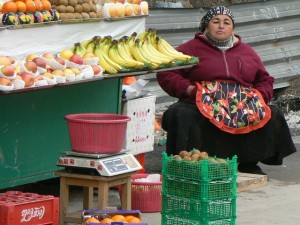
(By contrast, I have met some Russian LGBTs who have come out to their open-minded families and been accepted and protected against social bigotry. Activist Nicholai Baev in Moscow told me about his kind-hearted mother who always suspected her son was different and was not surprised when he came out to her. “She wants me to be safe and happy,” he said, proving the point again that rejection and scorn are not consistent across religious or cultural lines.) (photo right, Tashkent market babushka selling fruit)
Some parents see the deeper truth that comes from nature rather than from a mysterious scriptural history of myth. For many families, love transcends any invented religious opinion, which Jaris thought was more commonly among Christians than Muslims. But for the LGBT son or daughter in a devout Uzbek family there is little space to breathe and little time to get out,
Fourth Contact
A fourth conversation, in Tashkent, was with an American actor (at the Ilkhom Theatre) who’s lived in the capital for almost ten years. David verified much of Jari’s observations over dinner one evening with his pretty red-haired Uzbek-Russian wife sitting next to him. “There is much hostility in Uzbekistan toward LGBT people, first because it is a criminal offense (although the law is rarely enforce, he thought) but mostly because people are irrationally religious–whether church-goers or not–and afraid (read, ignorant) of homosexuality.” (David referred me to the Uzbeki actor mentioned above: read the interview with Maxim here.)
For gays they live in fear they might be found out and bring a “horrifying dishonor” to their family not to mention shaming judgment from neighbors and extended family. People live close together here, proximally and socially, often three or four generation together in one large house; they make it their business to know others’ business. Life for most people here is ‘small’ so every issue is a big deal–a new cow, death in the family, cotton crops (Uzbekistan is the world’s third largest exporter of cotton), a new tractor, kids’ school clothes, who is married and who is not–and why.
Life is also ‘tight’ here as the government tries to silence any dissent or media coverage that might discredit the national pride. Again, there are no public newspapers in this city of over two million people. There is a state news bureau that puts out authorized information while the opposition newspaper ‘Uznews’ operates from Sweden: http://www.uznews.net/en, which reads like tales of woe, injustice and police abuses.
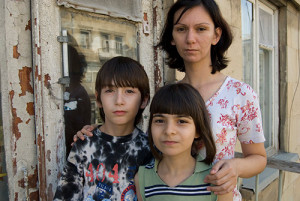 A photographer was put on trial in 2009 for displaying images of poverty and inequality in rural Uzbekistan. (http://www.rferl.org/photogallery/3213.html). “She was accused of slander, allegedly ‘insulting the Uzbek people’ after she produced a book portraying rural Uzbekistan and Uzbek traditions. She was charged on January 13, after an expert panel of ‘specialists in the fields of religious affairs, spirituality, and psychology’ found that her images portrayed Uzbekistan in a negative light… (http://en.wikipedia.org/wiki/Umida_Akhmedova). (photo right, impoverished family)
A photographer was put on trial in 2009 for displaying images of poverty and inequality in rural Uzbekistan. (http://www.rferl.org/photogallery/3213.html). “She was accused of slander, allegedly ‘insulting the Uzbek people’ after she produced a book portraying rural Uzbekistan and Uzbek traditions. She was charged on January 13, after an expert panel of ‘specialists in the fields of religious affairs, spirituality, and psychology’ found that her images portrayed Uzbekistan in a negative light… (http://en.wikipedia.org/wiki/Umida_Akhmedova). (photo right, impoverished family)
In February 2010 she was found guilty of slandering and insulting the Uzbek people, but was absolved of the charges and was released. Although the charges carried a prison sentence of up to three years imprisonment, the judge waived a penalty saying that the convict was granted an amnesty “in honor of the 18th anniversary of Uzbek independence.”
From such a slight infraction and its serious consequences one can easily imagine the rukus that would result from a LGBT person coming out in public. So gays stay silent or emigrate.
David said this was all the more sorry because the ancient arts of the ‘Stans’ was replete with homoerotic references, in music, poetry, dance. “But all that was repressed when the Soviets arrived. Today not only the artists but many tradesmen leave the country (for Russia mostly, also for Kazakhstan) because of unemployment and inflation–as well as the persistent paranoia that pervades everyday life (read, police on every corner).
David explained that the Ilkhom Theatre (photo left) is the only place in the country where freedom of expression still exists, at least for now. On the night of my attending a performance of a play (staged by an American rep company) a policeman was unexpectedly stationed near the entry hall of the theatre without prior notice to the manager.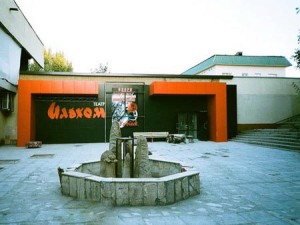
But even in Russia, foreign residents are now often the target of prejudice and hostility especially since the passage of the anti-gay law last year which has whipped up resentment against ‘others’. This in addition to a new law requiring popular online bloggers to register with the government, as part of the paranoia to filter the Internet and tighten censorship. It has banned all major Western online social media sites, including Facebook, Twitter, YouTube and Google.
Modern Dangers for LGBTs
Virtually no news or information about LGBT life in UZB comes out of the country. The most recent item was from an unusual story in February 2014 in Fergana News (online only: http://enews.fergananews.com/articles/2879 –such a newspaper would never be allowed to appear on the streets of any city in Uzbekistan).
The story was written by a journalist (using a pseudonym) about a gay man who was blackmailed in a sting operation. Although Uzbekistan’s anti-gay law is rarely enforced its presence creates a shadow of pervasive fear: “the very existence of the law creates a source of income for the Uzbek police and a source of trouble for gay people. If there is a need to set someone up or pressure someone, this law is a good instrument,” said a former criminal investigator who now works as an attorney. “Faggots are milked, extorted under the threat of a [criminal] examination.”
The Fergana News report continues:
“For a gay case to be referred to the police, there have to be witnesses of the intercourse, or at least witnesses who saw the two men together in an apartment. From the legal standpoint, the witnesses are useless, even in Uzbekistan where justice is blind and corrupt, but from the point of view of an Uzbek gay person, it is social suicide. And in Iskander’s (the sting victim) case, the policemen had strong leverage, namely, a transcript of the web chat between him and Jakhongir (the fake gay working with the police), where the former candidly wrote what he dreamt of doing with the latter, and how.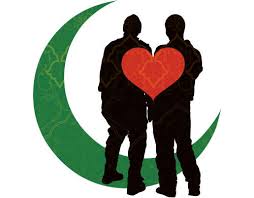
“Seeing no exit from the sting, Iskander asked the police if there was ‘another way’ to deal with the situation. The policemen asked for $3,000, but Iskander told them he did not have that kind of money. After ten more minutes of bargaining, threats and pleas, the policemen accepted $1,100 in Uzbek som and went away, together with Jakhongir. Afterwards, Iskander said, ‘My friends told me that I got away relatively cheaply. Some had to give [policemen] their cars, gold and other valuables. Because what is at stake is your family, job, social standing–your life.’
“Iskander’s case is not an isolated one. Several gay people in Tashkent, as well as the aforementioned former investigator, tell Fergananews.com that the ‘hunt’ for homosexuals is an old and lucrative source of extra income for the Uzbek police, who either look for gays at known meeting points or lure them out via dating websites.” (But, again, although this happens, it is not pervasive.)
Historic Erotic Traditions
The Fergana News writer, pseudonymed Oleg Ilyin, goes on to describe the historic ‘gay scene’ in his report.
“One of the most celebrated heros of Central Asia was the Zahir-ud-din Muhammad Babur (1483-1530) a conqueror from Central Asia who succeeded in laying the basis for the Mughal dynasty in the Indian Subcontinent and who became the first Mughal emperor. He was a direct descendant of Timur (Tamerlane) and also in the lineage of Genghis Khan. Babur is also accepted as an important poet and the author of the first autobiography in the history of Muslim literature.
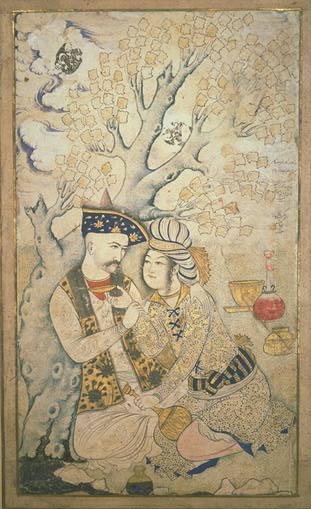 “In his autobiographic book, ‘Baburnama’, he describes his first love–a young man named Baburi: “There was a man in the camp, who had a son named Baburi. I felt exceptionally disposed towards him. Moreover, because of him I became sad and imprudent and confused…” For the first time the mighty conqueror felt love and passion. Such sentiments are believed to have been part of the homoerotic sub-culture of the Muslim Turkistan (most of today’s Central Asia) and Iran of that time.
“In his autobiographic book, ‘Baburnama’, he describes his first love–a young man named Baburi: “There was a man in the camp, who had a son named Baburi. I felt exceptionally disposed towards him. Moreover, because of him I became sad and imprudent and confused…” For the first time the mighty conqueror felt love and passion. Such sentiments are believed to have been part of the homoerotic sub-culture of the Muslim Turkistan (most of today’s Central Asia) and Iran of that time.
“Homosexuality was for centuries and still is part of Muslim men’s lives. Because marriage is very expensive coupled with a prohibition against premarital sex, the consequent lack of access to women has urged men into each others’ arms; aristocrats and the rich also enjoyed paid services of “beardless” bachas (boys), a tradition that has come down to present times in Afghanistan.” These details are taken from the original story by Oleg Ilyin: http://enews.fergananews.com/articles/2879. For more about homophilia and Islamic society see the story.
Today’s Cat and Mouse Game
The LGBT scene today has evolved far from that historic social tradition to a nervous hide-and-seek game between suspicious police and anxious LGBT citizens. Cruising parks and venues are few if any; vigilant police are everywhere as described above. Even at night there are eyes are upon wayward gays in search of contact. But there are not many visible gays to snatch up these days; they are frequently online or using their mobile apps trying to find Mr Right or Mr Right-away.
Police stings like the one described above await the unwary, the desperate and the horny seeker. Gays folks have wised up and are much more careful in their contact arrangements. Word spreads fast of dangerous usernames to avoid. There is a known community of LGBT users who are in contact–texting, e-mail, dating sites–that includes warnings as well cruisy inquiries.
And of course there is always the universal ‘gaydar’ of the public market where knowing looks and side glances communicate mutual desire.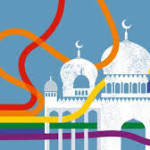
With no LGBT central organization or center the ‘scene’ is no where and everywhere, most especially in the major cities where the risk is reduced by high urban populations and covert locations. Most of this pertains to gay males. The idea of a woman out for a cruise in Uzbekistan is unimaginable.
However, in Tashkent, Samarkand, Andijon and other cities there is a middle class of young unmarried women–often university students or young professionals–who socialize with each other in certain cafes and restaurants such as the popular Angel Food restaurant or Fashion Bar in Tashkent. During our visit we saw small clutches of young women everywhere chatting and gossiping–most likely about family, work, studies and marriage, and very unlikely about about lesbian dating. Nothing overt ever comes up but that does not prevent two attracted women from branching off over coffee.
So the cycles of life–gay and straight–go on; the heart cannot be stopped by any authoritarian government because the will to love is greater than any effort to control or stifle it.
An Aside: Children and Others in the Cotton Fields
In authoritarian Uzbekistan thousands of people including students, professionals and state employees are required to go into the cotton fields every year in October to help with the harvest. One online news report from the opposition online Fergana,news.com (http://enews.fergananews.com/articles/2855 and 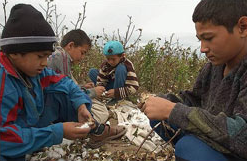 http://enews.fergananews.com/articles/2840) said “school children are not excused, not physicians, not breastfeeding mothers who have to take their infants to the cotton fields. (photo right)
http://enews.fergananews.com/articles/2840) said “school children are not excused, not physicians, not breastfeeding mothers who have to take their infants to the cotton fields. (photo right)
Uzbekistan has been successfully implementing this practice since the Soviet Union times. And it was perfected into virtual slavery of millions of citizens following after the independence in 1991.” During our tour I asked one of our guides if he picked cotton. He said he did when he was younger but now he pays someone else to go in his place. “or you can bribe a doctor to write a medical excuse–but that is not always accepted by the authorities.”
—–
Further references:
http://www.uznews.net/en/human-rights/25605-have-you-been-abroad-write-a-statement-clearly-detailing-your-activities
Residents of Tashkent province wishing to exchange old passports for new ones containing biometric information are required to attend a police interview.
http://www.uznews.net/en/human-rights/25815-video-cameras-at-tashkent-internet-cafes-%E2%80%93-they-will-make-you-safer
New Uzbek government requirements imposed on the Internet providers and outlets, who provide access to the Internet. Starting on April 1 Internet cafes located in basements and semi-basements have been banned from operating. In addition, Internet cafe owners have been required to install video cameras and keep log-files of their customers’ web browsing history for up to three years. Fom Kudrat Babajanov, Uznews.net correspondent and editor in Sweden.
http://www.uznews.net/en/human-rights/25664-islam-karimov-and-his-deadly-long-arms This is an anti-Karimov documentary film.
http://www.uznews.net/en/human-rights/26117-malohat-jeshankulova%E2%80%99s-health-remains-fragile
Being a human rights activist and a journalist in Uzbekistan is dangerous for one’s life and health.
http://www.uznews.net/en/human-rights/26079-uzbek-birdamlik-members-prevented-from-participating-in-online-conference
Conference prevented by authorities.
http://www.uznews.net/en/human-rights/26132-two-uzbek-journalists-on-100-information-heroes-list
Uzbek reporters jailed.
http://www.uznews.net/en/human-rights/26150-human-rights-activist-uktam-pardaev-under-intensifying-surveillance
An activist is followed.
Mamba.ru
Popular dating website.
http://en.wikipedia.org/wiki/LGBT_rights_in_Uzbekistan
Gay rights in Uzbekistan.
http://www.homoerotimuseum.net/asi.html
Multi-national Homo-erotic Art Museum.
Text and most photos by Richard Ammon
Also see Gay Uzbekistan News & Reports
Also see: Uzbekistan Photo Gallery

